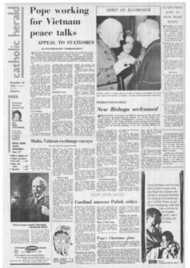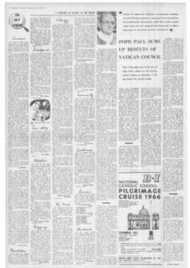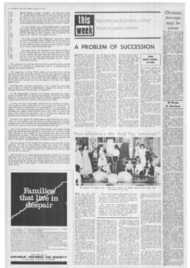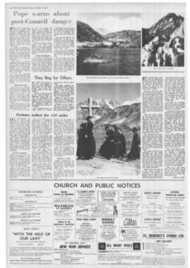Page 2, 24th December 1965
Page 2
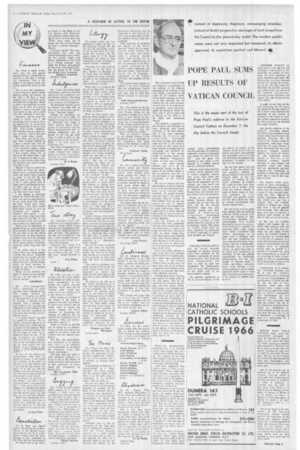
Report an error
Noticed an error on this page?If you've noticed an error in this article please click here to report it.
Tags
Share
Related articles
Views On Family Planning
What We Need Now Is A Policy For The War That Might Just...
A British Priest Suggests A Way For Britain
We May Be Only Bar To A Suicide
Catholics Urged To Influence Opinion
F eieese-ttesteteee
Sir,----With so much written these days for and against planned giving, I would like to mention a side that is usually not mentioned. This is the plight of the person, poor, but trying desperately hard to hide it.
This is my own experience. I was living in a parish where planned giving was started. At the time I did have a small business, but it had been going downhill for a long time. Many a week I was hard put to even keep out of debt. For several winters I wore a coat that had been given to me, and I could not have afforded a new one, Naturally I did not want the world to know, and I did everything that I could to keep up appearances. It would have been impossible for me to even offer half-a-crown regularly. My business was to a great extent seasonal, and 1 did• give what I could. when I could.
More than once in the summer when business looked up I gave a pound note, but the winter-time was a great worry. I can remember many a week when, after expenses were paid, I had roughly about 15s. to spare for the whole week. I did try, in desperation once, to explain to the parish priest what the situation was, but he would not listen to me.
Because I had no option but to refuse to enter any agreement to give a stated sum each week, the parish priest refused to speak to me for the last three years in that parish. As it was a small parish, and, in times past I had been given lots of little jobs to do in the church, I felt this terribly—no one will know how much.
I was getting so desperate about the whole situation that, had I not had the good fortune to get away from that parish the time would have come, quite soon, I fear, that I would have been forced to give up practising my religion altogether. This parish. I may say, was where 1 had been born and spent all my life. It was this situation alone, that caused me to leave my home town.
There must be thousands of people living on small incomes who do give all that they can, but are loth to let the whole world know of their financial position, who find this planned giving a very great worry. If I were a parish priest I would try anything rather than start this plan.
I do realise that it is fine where there are young people earning big money, especially where they do not give all that they could, but there arc also, always the poor, and the people living on fixed incomes to whom it can be a constant source of worry.
Please do not mention my name or address if you publish this, as I do not want to em• barrass anyone, And-planner.
Sir, — Your correspondent T.K.L. (December 3) warns parishes about planned giving. Yes, indeed, parishes be warned. A meeting was called at the presbytery of our parish to consider a planned giving scheme. Only a selected few were called to this meeting and objections to this scheme could not he seriously considered as our priest had already committed the parish.
A "Loyalty Dinner" was held to launch the scheme. We received a brochure, the cover of which depicted a child holding a candle with the caption "Brief Candle or Glowing Future". On the next page we read: "It depends so much on you. If we are to preserve our Catholic Way of Life for our children, just as our forefathers did for us, we must accept that the finance of our Church in this Parish is OUR RESPONSIBILl rv".
In fact, we are allowed no responsibility other than the giving of money, I was visited by a member of the parish to ask me to join the scheme. and 1 was told that the reason why some of us did not like the scheme was that -we had it on our consciences that we did not give enough to the Church.
On asking to see the form of the pledge I was told I could not see it unless I first agreed to sign. I then asked what would happen if I pledged and failed to keep up the contributions, and the answer given was that this had not yet been decided.
Many firms employing doorto-door salesmen have had to revise their methods, but our Church seems to be lowering its standards in its ways of raising money.
Gordon Whitt
(31241.406#4471010
Sir,—Is there any logical reason why the service of Benediction of the Blessed Sacrament should still be in Latin, twelve months after the introduction of the vernacular in the Mass and the Sacraments?
We heard read in the Grad
ual Psalm of the Mass of the 21st Sunday after Pentecost, and repeated several times during the week on feria days, that "When Israel came out of Egypt, the sons of Jacob heard no more a strange language". (Knox).
Fortunate people! The everdiminishing few who still attend Benediction have to hear the two hymns, psalm and prayer addressed to Our Lord in a "strange language" still, while the Rosary and prayers to Our Lady, and, during October, the prayer to St. Joseph are recited in the vernacular.
Harold E. Goodway.
Banbury, Oxon.
Sir,—] am a practising High Churchman. and have received instruction for acceptance into the Roman Church. One thing hinders me, however. and that is the question of Indulgences.
No intelligent Roman, priest or layman, has been able to give me a satisfactory answer to this "fairyland magic".
During the discussion on Meeting Point on the BBC, on Sunday evening last, the Abbot of Downside was asked a direct question about Indulgences. in connection with the Pope's announcement that "a plenary indulgence can be gained by all who go three times to hear a talk on the achievements of the Council". (Page I of your issue of December 10.)
The Abbot floundered for a few seconds, and then discreetly changed the subject, giving no answer. Can anyone help me to a real understanding of this matter?
R. S. Sharpe London. S.E.3 Sir,—Annually I have suffered from those allegedly heartrending stories which worm their way into newspapers, both secular and religious, at this time of year. *1 he mawkish, the cute, have revolted me. But alas, I have changed, though I have had to wait a year to recount the following: Christmas Day about 2.10 p.m. Two children, aged about four put their pennies in the box in front of the crib. Then they sang: "Happy Birthday to You."
John Ellison Leeds, I Sir,—May one ask, in connection with the recent debate in the House of Lords on proposed amendments to the present law against criminal abortion, where were the 50 Catholic peers whom one understands are entitled to sit in the House of Lords?
From reading an account of the debate in the press, it appeared that only two Catholic peers were present, one of whom tried to quash the second reading the B ill obtained by proposing the reading be deferred for six months (the traditional way of quashing a Bill), and another who spoke against it.
Those in favour of the Bill are no doubt so on humanitarian grounds, but advice was sought in the House from the Church and the medical profession.
The Bill, one understands, was withdrawn in its present form. but is to be redrafted and re-presented, if not before the Christmas recess then shortly afterwards.
May one hope that when it does reappear Catholics entitled to sit in the House of Lords will do so and give voice to the conscience of many about the inviolability of human life?
Miss Gwendollne Willis London, S.W.3 Sir.—Twice in recent weeks while praying in a Catholic Church, I have been approached and asked for money by men down on their luck, I found it impossible to refuse.
Entirely with the wrong motives -I didn't want the men to think I was a hypocrite--f forked out. Afterwards my conscience was pricked, thinking of Christ's words, "I was hungry and ye gave me to eat . ." Still, it annoyed me that the church was being used for a form of moral blackmail.
Perhaps both men were genuinely desperate for help. but then again I suggest priests keep a sharp eye out for "professional beggars" operating in church doorways and pews.
Michael Stevens London, N,W.3
Sir,—Some weeks ago you published a letter of ours on the liturgical changes. We did not see the succeeding issues, so we do not know if it produced any reaction; but the recent letter of I. R. Soaps (November 26) seems to raise sufficiently similar problems to warrant further comment.
The point about the outward changes, as we see them, is that, whether in language or in ritual, they are neither for nor against but quite irrelevant as such to the traditional doctrines of transubstantiation and eucharistic sacrifice.
While there is nothing in the use of an altar-table, however, which of itself denies those doctrines, there is much advantage in it in bringing home the nature of the eucharist as a banquet to which we are invited as well as a representation of the sacrifice of Calvary in which we share as the Mystical Body of Christ . .
When we find people complaining about changes in worship on doctrinal grounds we suspect that their problem is in the subjective realm. Too many Catholics used to think of the priest as performing the sacrifice like a surgeon performs an operation or a violinist performs a piece of music.
In their eyes he was exactly like such a technical virtuoso, up there in front of them, endowed with special gifts. There was even an element of the conjuror about him, for he was thought of as doing something which was not only a tour de force but actually "out of this world". The use of Latin heightened the effect, for—as Mr, Kenworthy Browne and his Latin society inform us— many people crave for Latin as something to lift them out of the "triviality" of life.
The purpose of the reforms. in our view, was to bring people down to earth where they belong, to remind them that great Cathedrals with long vistas (where this magical idea of the Mass first came about) are all very well, but that since life is trivial and we are each a unity in ourselves, our place as worshippers is in the trivial world, eating our eucharistic bread at a cafe table. This is not a Pinteresque paradox but a terribly real and straightforward fact.
Luther's dictum, simur Justus et peccator, might well he borne in mind here. We do not suddenly cease to be trivial people by going into church and witnessing a sacrifice, consoled by the comforting thought that this is something that could not take place if priests were "merely presbyters or elders" presiding at a "community hymn singing".
We are not "safe" in church any more than we probably would be in a nuclear fall-out shelter! We cease to be trivial only insofar as we accept Our Lord's invitation to share with Him His work of redeeming love.
This work is something very much rooted in this world, the trivial world which God condescended to redeem and which he will raise again at the Last Day to share eternity with Him.
The priest is one with us in this world, representing us to God and representing God to us_ but essentially one of us, incapable of existing apart from us, the Body of Christ, the Priesthood of the Faithful; and, when, in church we can now face him over the "work table" or "meal table", using our everyday trivial words, we are in a better position to understand the nature of the sacrifice in which we are privileged to participate. Thus rightly understood, these changes serve to strengthen the traditional doctrines of our faith, not to undermine them.
Margaret and lam Pinnington.
Southampton.
-ge
Sir,—Those who share Mr. Scans' bewilderment over the liturgy will appreciate Canon Burrett's explanation (December 10) of the position, but it is unlikely to alleviate their distress.
In describing the Mass as "a Sacrifice-Meal or a MealSacrifice"the Ca non implies that the prandial aspect of the Mass is, at the least, equal in importance to its sacrificial aspect. This is hardly so.
No one will deny the wonderful nature of the Sacrament whereby we partake of the Body of Our Saviour; but immeasurably more significant is the Sacrifice which secured our Redemption, of which the Mass is the perpetual renewal. The relative importance of the two in the eyes of the Church can be judged from The fact that whereas we arc commanded to hear Mass every seven days, we are only obliged to receive Communion once yearly.
Measures such as the replacement of the high altar (which sufficiently resembles a table for Canon tiurrett's purpose) by a table (which does not look like an altar at all) degrade the Mass as a Sacrifice while in no way enhancing the dignity of the Eucharistic Sacrament; and its relegation to the foot of the altar steps merely hides it from the majority of any large congregation.
Such measures, by lessening the dignity of the Holy Sacrifice, hinder the true participation which involves the heart and spirit, and which, while it primarily depends indeed upon striving for an ever greater understanding of the true meaning of the Mass, is greatly influenced by the external forms employed, and demands a form both of ceremonial and of language— appropriate to the sublime solemnity and mystery of the Mass.
The present trend appears to regard it as more important that the congregation should "Took as if they are participating" than that in truth they should actually he participating.
Peter Kenworthy-Browne London, S.W.7 Sir,—The petition to be presented to the hierarchy by the Latin Society asking for the compulsory saying of a Latin Mass in each church in England follows a development towards the de-vernacularisation of the liturgy expected by certain Nonconformist and Low Church Anglicans once the Vatican Council has ended.
They also predict a decline in our present interest in the Scriptures and a reduction in the importance now being given to the layman. It will he interesting to sec what happens.
Lawrence Scoon Work ington.
Sir,—At a recent discussion between priests and laymen the question of creating a community spirit among small parish groups was raised. A suggestion was made that a dedicated parishioner, to act as a catalyst, should be found in each group whose duty it would be to obtain volunteers to carry out such practical charitable action as visiting the sick, old and lonely, supplying baby sitters, taking children to school and so on.
Such help would not be confined to Catholics only but it was argued that the involvement of Catholics as helpers would cement them 'together and create a community spirit more effectively that the establishment of societies a n d sodalites operating inside and for the "ghetto".
It would be interesting to hear your readers views on this proposal and to learn whether any such movements are already operating.
John Wheeler Tunbridge Wells Sir,—In Maureen Phillips' letter (December 3) on "Old People" I see the answer for many a lonely but active person,. Why not step out of your loneliness and visit someone who is old and lonely in hospital, whether in a mental hospital or in a geriatric ward?
Christmas time can be very lonely both for the well and for the sick, and for those who are diffident about starting out on something of this sort, Christmas is a good time to begin.
Most people will agree with me, I know, that the "visitor" gets as much happiness out of this as the "visited" and real and lasting friendships are often made in this way.
Frances Sellars London, N.W.3.
Sir,—May we the under signed priests make the request that in future the Catholic Truth Society provide bilingual texts in Latin and English in their publication of Council decrees?
Amandus Rogenmoeer,
C.M.M.. Joseph RONAACH, S.C.I., John Harden, John O'Sullivan, Edna Keenan, Chrysanthus van de Levert, ('.M.M. Patrick O'Neill, AA., Terence Iligems, David Johnston, John ('Mahoney, Francis Hastings. Deanery of Chelmsford. Essex.
Sir. Mr. Patrick Wall, M.P., appealed {December 3) to our greed and selfishness by warning us of "a cut in the standard of living in order to obtain a more equal standard of living in both the Common wealth and 'the world", This is just what loyal Rhodesians feared and what Mr. Smith is banking on. He, on the other hand, calls on his followers to make sacrifices to uphold his policy which leans towards a Police State and a kind of apartheid. At least he has the courage of his convictions while we are failing the peoples and driving them into the arms of the Soviets.
D. M. Woods Alderly Edge,
Cheshire.
blog comments powered by Disqus


